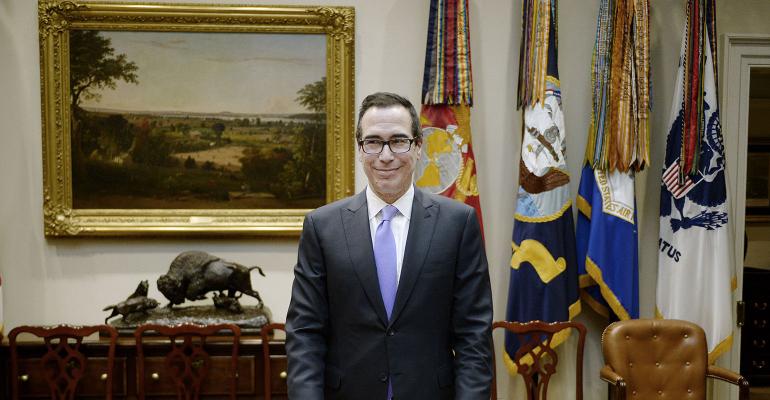By Alexandra Harris
(Bloomberg) --Treasury’s move to include a two-part question about ultra-long bonds in its latest primary dealer survey has analysts concluding that Secretary Steven Mnuchin is committed to exploring the feasibility of a security due in more than 30 years.
In its questionnaire released Friday in advance of the May refunding, Treasury asked the 23 primary dealers what it should consider when structuring a bond with a maturity longer than three decades, such as in 40, 50 or 100 years. It also asked, “At what price relative to the current 30-year bond offering could Treasury reasonably expect an ultra-long to price?”
The detailed inquiry marks a shift from the last time Treasury brought up the topic, in 2014, when the department merely asked, “Should Treasury consider issuing a security with a maturity greater than 30 years?”
“The questions are a bit more pointed, so it sounds like Treasury is indicating they’re somewhat more inclined to move forward on ultra-long issuance,” said Mark Cabana, head of U.S. short rates strategy at primary dealer Bank of America Corp. “When the question was asked in the past it was about the benefits of issuing an ultra-long bond.”
In February, Mnuchin said in a CNBC interview that issuing ultra-long bonds is something “we should seriously look at” since interest rates are likely to stay low for a long period. He said while he instructed his staff to begin researching the option, he wasn’t ready to announce anything concrete.
Treasury currently issues coupon-bearing debt with maturities ranging from two to 30 years. Other countries have opted to sell bonds due in more than three decades -- Spain, Belgium and France issued 50-year bonds in 2016.
Even without introducing a new longer-dated obligation, the U.S. has already been extending the average maturity of its debt, after it tumbled in the wake of the financial crisis as Treasury ramped up bill issuance.
The Treasury Borrowing Advisory Committee, a group of professionals from investment funds and banks that offers recommendations to department officials, has also discussed ultra-long issuance. At its Jan. 31 meeting, one member presented a review of issuance strategies in historical rate environments, “noting that longer-term debt strategies could have performed better as rates generally increased while shorter-dated issuance strategies performed better in declining rate environments.”
Minutes from the committee’s April 2009 meeting showed members said such issuance “did not serve any purpose,” and Treasury’s goals would be better served through prevailing offerings. The group revisited the issue in 2011, when participants cited demand from entities with longer liabilities and said Treasury should consider adding instruments that might be attractive to pension funds.
In past administrations, “TBAC had an extremely powerful voice,” said Michael Cloherty, head of U.S. interest-rate strategy at primary dealer RBC Capital Markets. “We don’t know if that’s going to change.”
To contact the reporter on this story: Alexandra Harris in New York at [email protected] To contact the editors responsible for this story: Boris Korby at [email protected] Mark Tannenbaum, Elizabeth Stanton

